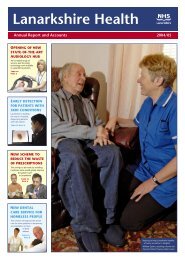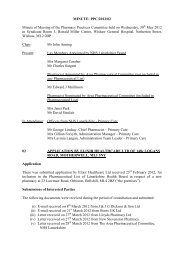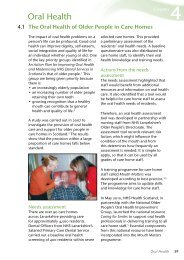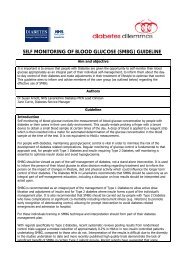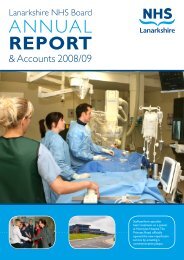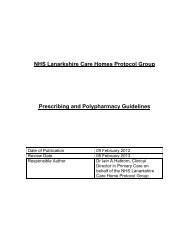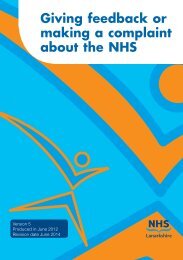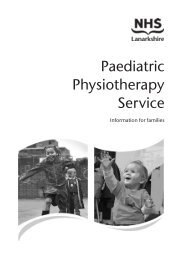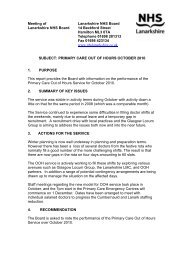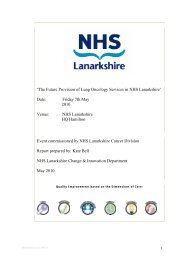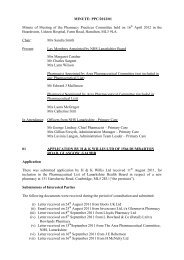Palliative Care Guidelines - NHS Lanarkshire
Palliative Care Guidelines - NHS Lanarkshire
Palliative Care Guidelines - NHS Lanarkshire
- No tags were found...
You also want an ePaper? Increase the reach of your titles
YUMPU automatically turns print PDFs into web optimized ePapers that Google loves.
<strong>Palliative</strong> <strong>Care</strong> <strong>Guidelines</strong>: ConstipationConstipation in <strong>Palliative</strong> <strong>Care</strong>IntroductionConstipation is the passage of small, hard faeces infrequently or with difficulty, and less often thanis normal for that individual.Assessment• Normal and current bowel pattern (frequency, consistency, ease of passage, blood present,pain on passing stool).• Current and previous laxatives taken regularly or as needed, and their effectiveness.• Clinical features may mimic bowel obstruction or intra-abdominal disease.o Paino Nausea/ vomiting, anorexiao Flatulence, bloating, malaiseo Overflow diarrhoeao Urinary retention• Cause of the constipation.o Medication: opioids, anticholinergics (hyoscine, cyclizine, tricyclic antidepressants),antacids, diuretics, iron, 5HT 3antagonists.o Secondary effects of illness (dehydration, immobility, poor diet, anorexia).o Tumour in, or compressing, bowel wall.o Damage to lumbosacral spinal cord, cauda equina or pelvic nerves.o Hypercalcaemia.o Concurrent disease e.g. diabetes, hypothyroidism, diverticular disease, anal fissure,haemorrhoids, Parkinson’s disease, hypokalaemia.• Clarify cause before starting treatment of constipation.o Abdominal and rectal examination are essential.o To exclude bowel obstruction/ assess extent of faecal loading, an X-ray may be needed.ManagementGeneral• Encourage a good oral fluid intake (2 litres a day, if able); review diet.• Ensure patient has privacy and access to toilet facilities.• Address any reversible factors causing constipation.• If current regimen satisfactory and well tolerated, continue it but review patient regularly andexplain importance of preventing constipation.Oral Medication• Use oral laxatives if possible.• Rectal treatment may be needed for faecal impaction, and for paraplegic or bedboundpatients.• If rectum is ballooned and empty, do not give rectal treatment.Option A (combination of stimulant and softener)Senna 2-4 tablets or bisacodyl 5-10mg, at bedtime in combination with docusate sodium 100mgcapsule, twice dailyOption B (osmotic laxative)Macrogol (Movicol ® ) 1-3 sachets daily• Severe constipation; consider a higher dose for three days.Option C (combined stimulant / softener, licensed for terminally ill patients)Co-danthramer 1-2 capsules or co-danthramer suspension 5-10ml; at bedtime.Co-danthramer strong 2 capsules or co-danthramer strong suspension 5ml; at bedtime.© <strong>NHS</strong> Lothian Issue date: January 2009 Review date: March 20121



